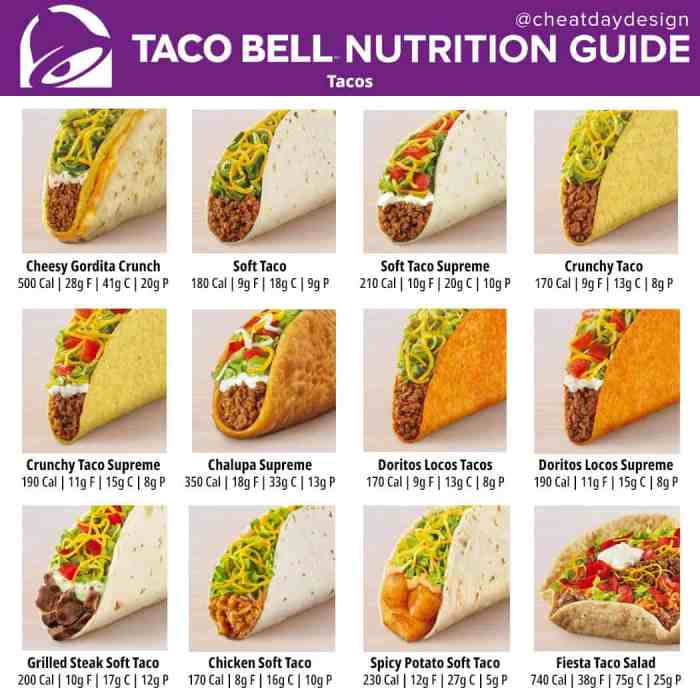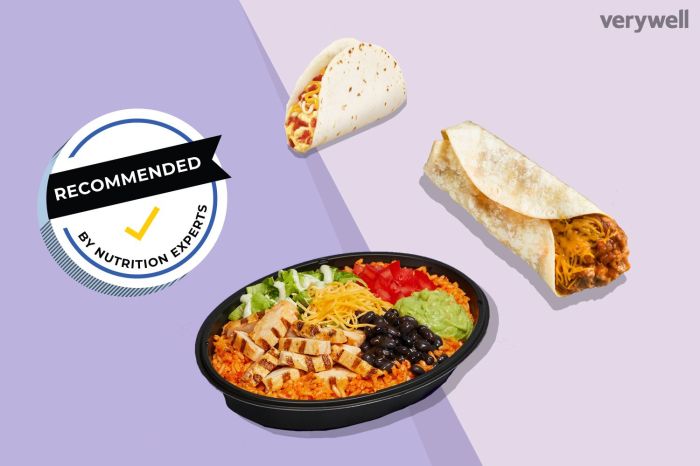Taco Bell Taco Nutritional Content Overview

Taco bell taco nutrition facts – Fueling your body with the right information is just as important as fueling it with the right food. Understanding the nutritional content of your favorite fast food is key to making informed choices. This overview will equip you with the knowledge to navigate the Taco Bell menu with confidence.
Taco Bell Taco Nutritional Information
The following table provides a general overview of the nutritional information for some of Taco Bell’s most popular tacos. Remember that nutritional values can vary slightly depending on preparation and location. Always check the nutritional information available at your specific Taco Bell location for the most accurate data.
Understanding Taco Bell taco nutrition facts is crucial for mindful eating. For a contrasting example of sugary treats, you might want to check out the sweet tart ropes nutrition facts to see how drastically different the nutritional profiles can be. Returning to Taco Bell, comparing these figures helps illustrate the significant variations in caloric and sugar content between fast food and candy.
| Taco | Calories | Fat (g) | Protein (g) | Carbohydrates (g) | Fiber (g) |
|---|---|---|---|---|---|
| Soft Taco (Beef) | 180-200 | 9-11 | 10-12 | 20-25 | 3-4 |
| Hard Taco (Beef) | 170-190 | 8-10 | 9-11 | 18-22 | 2-3 |
| Cheesy Gordita Crunch (Beef) | 390-420 | 20-23 | 15-17 | 40-45 | 4-5 |
| Doritos Locos Tacos (Beef) | 200-220 | 10-12 | 11-13 | 23-27 | 3-4 |
Note: These values are approximate and may vary.
Variations in Nutritional Content Across Taco Bell Taco Options
Understanding the variations in nutritional content across different Taco Bell tacos is crucial for making healthy choices. These variations primarily stem from the type of shell, the filling, and any added toppings.
The differences are significant and can impact your daily caloric and macronutrient intake. Consider the following:
- Shell Type: Hard-shell tacos generally contain fewer calories and carbohydrates than soft-shell tacos due to the difference in the shell’s composition.
- Filling: Choosing leaner protein options, such as chicken or vegetarian fillings, can significantly reduce the fat and calorie content compared to beef.
- Toppings: Adding extra cheese, sour cream, or guacamole will substantially increase the overall calorie, fat, and sodium content of your taco.
Comparison with Competing Fast-Food Chains
Taco Bell’s nutritional profile compares differently to other fast-food chains depending on the specific item. A direct comparison requires specifying the exact menu items from each chain. For instance, a Taco Bell soft taco might have a similar calorie count to a similar offering from a competitor, but the fat and protein content could differ. Always compare like-for-like to get a true understanding of the nutritional differences.
Consulting the nutritional information provided by each chain is essential for accurate comparisons.
Nutritional Comparison

Let’s face it, the siren song of Taco Bell is powerful. But when it comes to nutrition, understanding the differences between their offerings and a homemade alternative is crucial for making informed choices that support your well-being. We’ll dissect the nutritional landscape, empowering you to make the best decisions for your health.We’re going to compare a typical Taco Bell taco with a homemade equivalent, highlighting the key nutritional disparities and demonstrating how simple ingredient swaps can drastically alter the nutritional profile.
This isn’t about demonizing fast food; it’s about equipping you with the knowledge to make conscious, healthy choices.
Taco Bell Taco versus Homemade Taco: A Nutritional Breakdown, Taco bell taco nutrition facts
The following points illustrate the stark differences between a standard Taco Bell taco and a healthier homemade version. Remember, these are general comparisons and specific nutritional values will vary based on ingredients and portion sizes. However, the overarching principles remain consistent.
- Calories: A typical Taco Bell taco can easily exceed 200 calories, often closer to 300 depending on the type and additions. A homemade taco, using lean protein, whole-wheat tortillas, and plenty of vegetables, can easily stay under 200 calories. The difference can be significant when considering daily caloric intake.
- Fat: Fast-food tacos often contain high levels of saturated and unhealthy trans fats from the ground beef and added oils. Homemade tacos, using lean ground turkey or chicken breast, and avoiding excessive cheese and sour cream, significantly reduce the fat content, promoting heart health.
- Sodium: Taco Bell tacos are notorious for their high sodium content, often exceeding the recommended daily intake in just one serving. Homemade tacos allow for complete control over sodium levels, using herbs, spices, and low-sodium ingredients to create delicious flavor without the excess salt.
- Fiber: Homemade tacos, made with whole-wheat tortillas and plenty of vegetables like lettuce, tomatoes, and onions, are rich in fiber, promoting digestive health and satiety. Taco Bell tacos, often utilizing refined grains and limited vegetables, offer considerably less fiber.
- Protein: While both can offer protein, the quality differs. Homemade tacos using lean protein sources like chicken or beans provide higher-quality protein with less saturated fat compared to the ground beef often used in Taco Bell tacos.
Ingredient Modifications and Nutritional Impact
Making even small changes to your taco ingredients can dramatically alter its nutritional value. For example, switching from a standard flour tortilla to a whole-wheat tortilla instantly boosts the fiber content. Using lean ground turkey or chicken instead of ground beef significantly reduces saturated fat. Loading up on vegetables adds vitamins, minerals, and fiber, while reducing the reliance on calorie-dense toppings like cheese and sour cream.
Even the type of cheese can make a difference – opting for lower-fat options can decrease the overall fat and calorie content.
Potential Health Benefits of Homemade Tacos
Choosing homemade tacos over fast-food versions can lead to several health benefits. These include:
- Weight Management: Lower calorie and fat content contribute to easier weight management.
- Improved Cardiovascular Health: Reduced saturated fat and sodium intake benefit heart health.
- Better Digestive Health: Increased fiber intake improves digestion and regularity.
- Enhanced Nutrient Intake: Homemade tacos allow for the inclusion of a wider variety of vegetables and other nutrient-rich ingredients.
FAQ Insights: Taco Bell Taco Nutrition Facts
What are the best low-calorie options at Taco Bell?
Generally, tacos with fewer toppings and smaller sizes are lower in calories. Look for options like a soft taco with just seasoned beef and lettuce.
Are Taco Bell tacos vegetarian-friendly?
Some Taco Bell tacos can be adapted for vegetarians, but always check the ingredients for potential cross-contamination or hidden animal products.
How does Taco Bell’s nutritional information compare to other fast-food chains?
Nutritional content varies significantly between fast-food chains. Some may offer lower calorie or lower sodium options, while others may be higher in certain nutrients or additives.
Can I customize my Taco Bell order to make it healthier?
Absolutely! Requesting less cheese, sour cream, or other high-calorie toppings can significantly reduce the overall nutritional impact of your meal.
